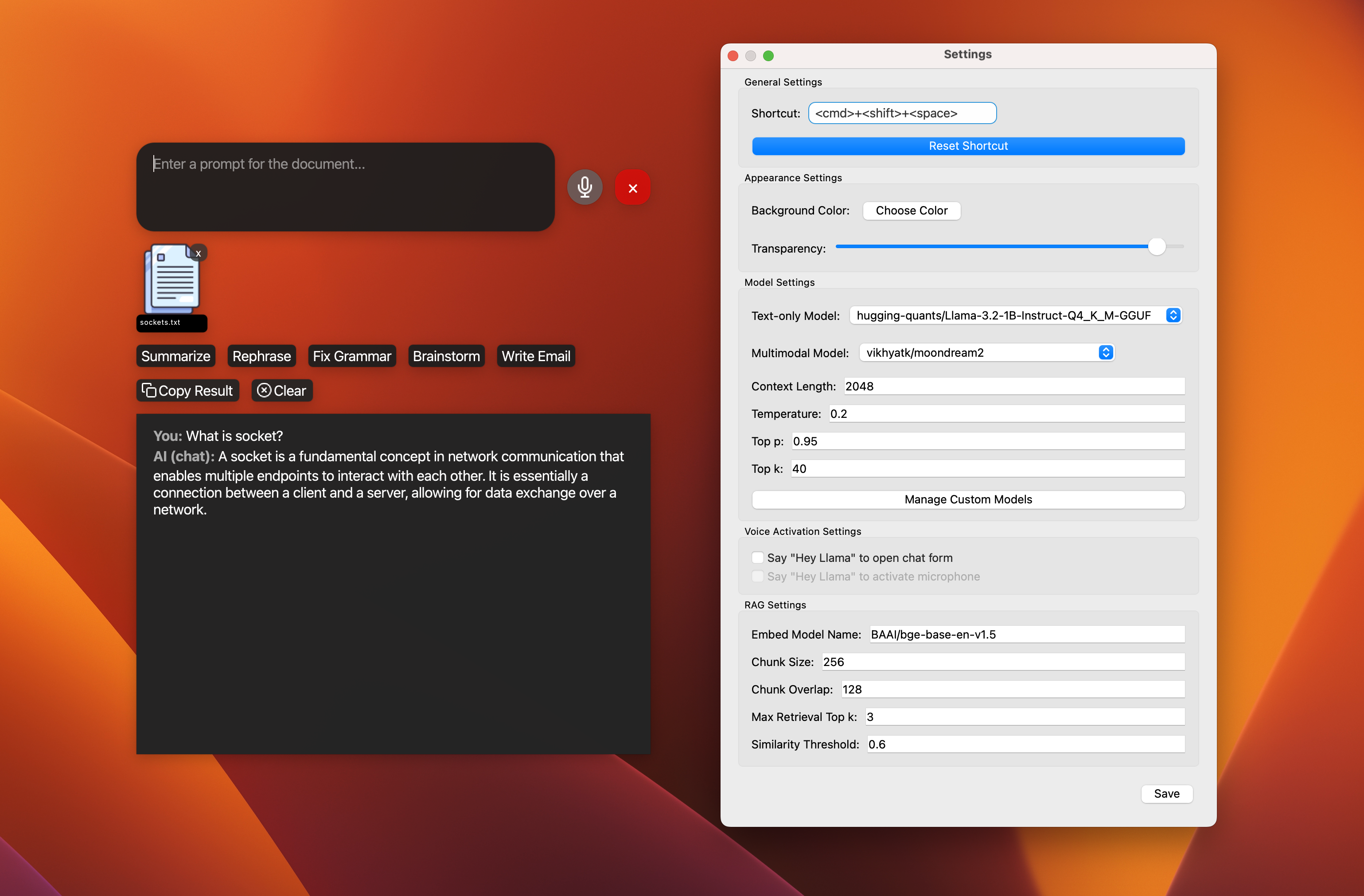
🌟 Llama Assistant 🌟
Local AI Assistant That Respects Your Privacy! 🔒
Website: llama-assistant.nrl.ai
AI-powered assistant to help you with your daily tasks, powered by Llama 3.2. It can recognize your voice, process natural language, and perform various actions based on your commands: summarizing text, rephrasing sentences, answering questions, writing emails, and more.
This assistant can run offline on your local machine, and it respects your privacy by not sending any data to external servers.
https://github.com/user-attachments/assets/af2c544b-6d46-4c44-87d8-9a051ba213db

Supported Models
-
📝 Text-only models:
- Llama 3.2 - 1B, 3B (4/8-bit quantized).
- Qwen2.5-0.5B-Instruct (4-bit quantized).
- Qwen2.5-1.5B-Instruct (4-bit quantized).
- gemma-2-2b-it (4-bit quantized).
- And other models that LlamaCPP supports via custom models. See the list.
-
🖼️ Multimodal models:
- Moondream2.
- MiniCPM-v2.6.
- LLaVA 1.5/1.6.
- Besides supported models, you can try other variants via custom models.
TODO
- [x] 🖼️ Support multimodal model: moondream2.
- [x] 🗣️ Add wake word detection: "Hey Llama!".
- [x] 🛠️ Custom models: Add support for custom models.
- [x] 📚 Support 5 other text models.
- [x] 🖼️ Support 5 other multimodal models.
- [x] ⚡ Streaming support for response.
- [x] 🎙️ Add offline STT support: WhisperCPP.
- [ ] 🧠 Knowledge database: Langchain or LlamaIndex?.
- [ ] 🔌 Plugin system for extensibility.
- [ ] 📰 News and weather updates.
- [ ] 📧 Email integration with Gmail and Outlook.
- [ ] 📝 Note-taking and task management.
- [ ] 🎵 Music player and podcast integration.
- [ ] 🤖 Workflow with multiple agents.
- [ ] 🌐 Multi-language support: English, Spanish, French, German, etc.
- [ ] 📦 Package for Windows, Linux, and macOS.
- [ ] 🔄 Automated tests and CI/CD pipeline.
Features
- 🎙️ Voice recognition for hands-free interaction.
- 💬 Natural language processing with Llama 3.2.
- 🖼️ Image analysis capabilities (TODO).
- ⚡ Global hotkey for quick access (Cmd+Shift+Space on macOS).
- 🎨 Customizable UI with adjustable transparency.
Note: This project is a work in progress, and new features are being added regularly.
Technologies Used
Installation
Recommended Python Version: 3.10.
Install PortAudio:
On Windows: Installing the MinGW-w64 toolchain
Install from PyPI:
pip install pyaudio
pip install git+https://github.com/stlukey/whispercpp.py
pip install llama-assistantOr install from source:
Speed Hack for Apple Silicon (M1, M2, M3) users: 🔥🔥🔥
Usage
Run the assistant using the following command:
llama-assistant
# Or with a
python -m llama_assistant.mainUse the global hotkey (default: Cmd+Shift+Space) to quickly access the assistant from anywhere on your system.
Configuration
The assistant's settings can be customized by editing the settings.json file located in your home directory: ~/llama_assistant/settings.json.
Contributing
Contributions are welcome! Please feel free to submit a Pull Request.
License
This project is licensed under the GPLv3 License - see the LICENSE file for details.
Acknowledgements
- This project uses llama.cpp, llama-cpp-python for running large language models. The default model is Llama 3.2 by Meta AI Research.
- Speech recognition is powered by whisper.cpp and whispercpp.py.
Star History
Contact
- Viet-Anh Nguyen - vietanhdev, contact form.
- Project Link: https://github.com/vietanhdev/llama-assistant, https://llama-assistant.nrl.ai/.














